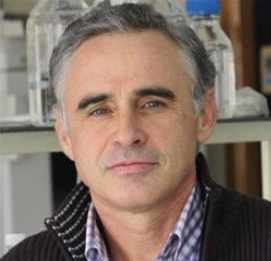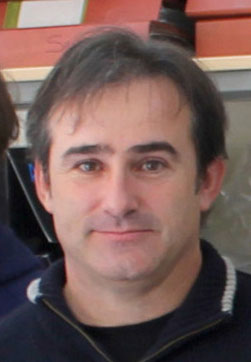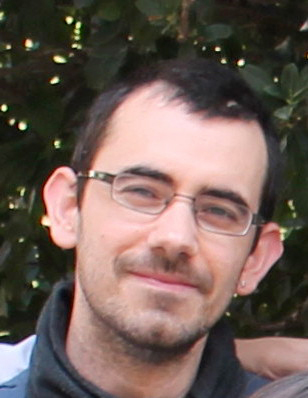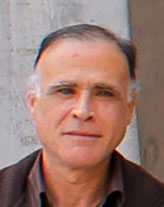Miembros actuales
 My research career began after completing my studies in Biological Sciences at the University of Murcia, in the Department of Genetics and Microbiology at the same university, where I completed my doctoral thesis on the regulation of acetate metabolism in the mucoral fungus Phycomyces blakesleeanus, under the supervision of Professors Francisco Murillo and Santiago Torres-Martínez. Subsequently, I undertook a postdoctoral fellowship in the laboratory of Prof. Paul Tudzynski (Institute of Botany and Botanical Garden, Westphalian Wilhelms-University, Münster, Germany), where I worked on a project aimed at identifying pathogenicity factors in the fungus Claviceps purpurea. After the postdoctoral period, I joined the research group "Genomics and Molecular Biotechnology of Fungi," which I currently lead.
My research career began after completing my studies in Biological Sciences at the University of Murcia, in the Department of Genetics and Microbiology at the same university, where I completed my doctoral thesis on the regulation of acetate metabolism in the mucoral fungus Phycomyces blakesleeanus, under the supervision of Professors Francisco Murillo and Santiago Torres-Martínez. Subsequently, I undertook a postdoctoral fellowship in the laboratory of Prof. Paul Tudzynski (Institute of Botany and Botanical Garden, Westphalian Wilhelms-University, Münster, Germany), where I worked on a project aimed at identifying pathogenicity factors in the fungus Claviceps purpurea. After the postdoctoral period, I joined the research group "Genomics and Molecular Biotechnology of Fungi," which I currently lead.My research career has focused on the molecular study of various aspects related to the biology of filamentous fungi, with a greater emphasis on the molecular mechanisms that regulate gene expression in fungi of the order Mucorales. My research in these fungi has centered on five fundamental lines: (i) using fungal biomass for biodiesel production, (ii) regulation of light responses, (iii) post-transcriptional gene silencing (RNAi), (iv) characterization of the molecular mechanisms involved in the virulence of Mucorales, and (v) the role of adenine methylation in the regulation of gene expression. Within these lines, our group has achieved significant successes. For instance, in the first line, I led a project in collaboration with Dr. G. Vicente’s group at Rey Juan Carlos University (Madrid), which resulted in two landmark studies in the field of biodiesel production from fungi. In the second line, I led a project that enabled the identification and functional characterization of several key regulators of the light response, including three photoreceptors. Regarding the study of RNAi, my work has focused on the characterization of a new non-canonical gene silencing pathway, which is involved in processes as relevant as pathogenesis and drug response in the fungus. In the fourth line of research, we have identified several virulence factors and developed genomic strategies and models to dissect the infection process, which we hope will contribute to the development of new antifungals to combat the lethal infection caused by Mucorales (mucormycosis). Currently, I am fully dedicated to determining the role of adenine methylation (6mA) in lower fungi, as they show much higher levels than other fungi and most eukaryotes and, therefore, may represent an unknown epigenetic regulation mechanism.
I maintain stable international collaborations with Prof. Joseph Heitman (Duke University, USA), Prof. Kaustuv Sanyal (Jawaharlal Nehru Center for Advanced Scientific Research, India), Prof. Ulrike Binder (Medical University of Innsbruck, Austria), Dr. Stephen Mondo (JGI), Prof. Teresa Pawlowska (Cornell University, USA), Prof. Yuanda Song (Shandong University of Technology, Zibo, China), and Prof. Victor Meza Carmen (Michoacán University of San Nicolás de Hidalgo, Mexico). Collaborations with Professors Song and Meza Carmen have made significant advances in understanding the regulation of lipid accumulation in the first case, and G-protein regulation of dimorphism and pathogenesis in the second case, in Mucorales.

I had been working with the mucoral fungus Mucor circinelloides, from the begining of my PhD under the supervision of Professor Santiago Torres-Martínez at the Department of Genetics and Microbiology of the University of Murcia. The PhD work studied the light regulation in M. circinelloides. Then, I performed a postdoctoral stay at the laboratory of Professor Francisca Sevilla at the CEBAS Institute (CSIC), where I worked in the study of antioxidant systems in pea and pepper plants. After that postdoctoral stage, I joined the research group Genomics and Biotechnology Molecular of Fungi of the Department of Genetics and Microbiology at the University of Murcia, of which I am Assistant Professor since 2012. My research within this group has focused primarily on issues related to the regulation of gene expression in M. circinelloides. Most of my work aims for the characterization of the molecular mechanisms controlling light responses in Mucor. We have identified a number of key genes of these regulatory mechanisms, which have proved to be extraordinarily complex.

I studied Biological Sciences at the University of Murcia (Spain), where I obtained the PhD degree in March 2006 with a research project supervised by the professors Rosa María Ruiz Vázquez y Santiago Torres Martínez at the Department of Genetics of that University. After a post-doctoral stay at the School of Biological Sciences, University of East Anglia (Norwich, UK), I moved back to the University of Murcia (Spain), as a senior researcher Juan de la Cierva in the group of Molecular and Cell Biology of the professor Senena Corbalan. At beginning of 2012 I started a Marie Curie contract (U-IMPACT program) in the group of María Ruiz Vázquez y Santiago Torres Martínez. My work in this group has been always focused on the RNA silencing mechanism in Mucor. As results of this work, we have characterized the silencing pathway in Mucor and highlighted its peculiar features, and have cloned and functionally characterized the main genes involved in this pathway. We have applied next generation sequencing to analyze the repertoire of endogenous small RNA molecules with regulatory functions and have identified different classes of small RNAs according to the proteins required for their biogenesis, which reflect a diversity of small RNA biogenesis pathways operating in this fungus. Work in progress seeks to identify the endogenous functions regulated by these small RNAs.

My research work began, after the completion of my Biology Studies at the University of Murcia, in the Department of Genetics and Microbiology of the same university, where I did my master's thesis under the supervision of Professors Victoriano Garre and Santiago Torres-Martinez. In this work, I tried to get a new selective marker for the fungus Mucor circinelloides. It was in the same department where I started my PhD under the supervision of the same professors in the research group "Genomics and Molecular Biotechnology of Fungi". My research focuses on the molecular mechanisms that control the light responses in Mucor. I have focused on locating the exact location where a protein involved in responses to light is modified. I have also performed several transcriptomic studies (microarray) seeking patterns of regulation in response to light.
Although so far I have focused on the study of molecular biology of filamentous fungi, I do not rule out working in other fields and other microorganisms or more evolved eukaryotes.
-







